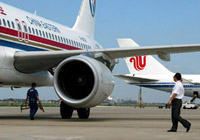
Domestic flights are expected to go up from next month until the end of the year after industry regulators yesterday told airlines they could collect fuel in view of rising international fuel prices.
Carriers will be allowed to introduce fuel surcharges on internal routes from next month until the end of the year, according to a document jointly released by the General Administration of Civil Aviation of China (CAAC) and the National Development and Reform Commission.
Passengers will have to pay an additional 20 yuan (US$2.46) if they fly less than 800 kilometers or 40 yuan (US$4.93) if they fly 800 kilometers or more.
The CAAC said that in the first five months of the year, revenue lost by domestic airlines totaled 340 million yuan (US$41.9 million).
The increase in operating costs as a result of surging fuel prices amounted to 3.54 billion yuan (US$436 million) over the same period.
Jet fuel prices have risen from 3,400 yuan (US$410) per ton early last year to the current 4,620 yuan (US$558) per ton.
The country's three major airlines, Air China, China Eastern and China Southern, made a joint appeal to the CAAC in May to allow them to collect a fuel surcharge.
A one percent increase in jet fuel prices equates to a 42.45-million-yuan (US$5.23 million) rise in the company's yearly transport costs, Luo Dewei, financial director of Shanghai-based China Eastern Airlines, was quoted by the Xinhua News Agency as saying.
Air China and Hainan Airlines hailed the policy change as "good news."
Airlines are under added pressure because jet fuel prices are controlled by the Civil Aviation Oil Corporation of China, the sole provider of jet fuel in the country.
However, a price hike is always a double-edged sword. What matters most to the airlines at the end of the day is consumer acceptance, particularly in this fiercely competitive industry.
An earlier appeal by the airlines was rejected by the CAAC in June. But the CAAC did make a concession and allowed airlines to make adjustments to ticket prices. Airlines have the leeway to price their tickets up to 25 percent higher or up to 45 percent lower than the base price, which is set by the government.
A CAAC official said that not all airlines have adjusted their prices.
(China Daily July 27, 2005)
|

